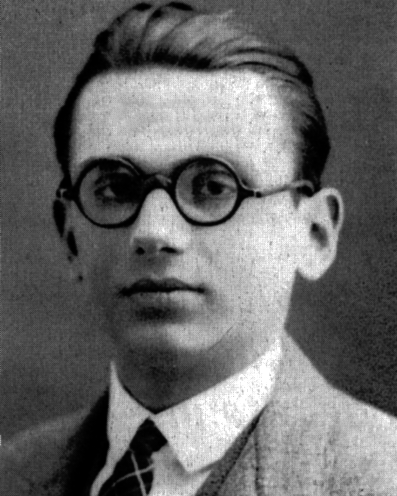The significance of mathematics - and why it can prove its own incompleteness
Hey guys,
the recent steemSTEM meetup offered so many nice and enlightening conversations about different topics that I even got to discuss mathematics for a while (usually a total buzz-kill but not here ^^) with a few people such as @dber, @saunter, @bendelgreco and @ertwo. This is a post partially inspired by some of said discussions about truth, provability and how distincly academic mathematics can diverge from the one you remember from school.
Mathematics as a science
Being one discipline of 'natural philosophy' before it separated into distinct sciences, the origins of modern math mainly lie in ancient hellenistic period. Its etymology can be traced to the Greek μάθημα (mathema) meaning 'subject of instruction' or 'something that is learned' and not only characterizes some of the ambivalence inherent to it in academics but also emphasizes its meaning as something that should be studied.
In practical terms, mathematics serves a a tool for other disciplines: Whether you are trying to compute integrals, solve equations, detect patterns, make predictions, prove theorems etc. it provides the techniques necessary. This is commonly reflected by mathematics departments giving lectures for students of various other academic disciplines - and said students still complaining about math that they were trying to get away from.
But somewhat unbeknownst to many people, math also exist as a sovereign field of its own. As such it represents the metaphysical endeavour to infer and build up complex and self-consistent logical structures from a minimal set of rules, the so-called axioms. The grade of abstraction involved can get pretty high although I'd say that the majority of study is still done with some real-life connection in mind.
Think of it as a thought experiment or Socratic exercise not unlike in philosophy:
Suppose you agree on a given set of fundamental laws of logic, that you accept to be universally valid. Under these assumptions you ask yourself, which additional propositions and results you can logically infer by virtue of the axiomatic rules available.
This is also referred to as syntactic deduction and any statement that can be obtained this way is called provable.
Gödel's Incompleteness Theorems
In principle the axioms accepted as premise can be as outrageous as possible as long as the entire set is self-consistent. To produce meaningful results however one would have to (and in fact does) chose reasonable axioms reflecting our intuitive comprehension.
For instance the ability to count in so ingrained into humans that the existence of natural numbers is basically non-negotiable in a mathematical logic. Any axiom set falling short of producing natural numbers is so obscure that it is even mostly uninteresting to all but the dedicated logicians amongst mathematicians.
The largest common foundation of mathematics is currently the ZFC axiom system (Zermelo-Fraenkel + axiom of choice) which is serving us very well and is thus far not known to be inconsistent.

But then in 1931 German/Austrian mathematician Kurt Gödel managed to show two incredible theorems, which almost become more fundamentally confusing the longer you think about them. In essence he demonstrated, that mathematics can prove its own limitation - which is both astonishing as well as discouraging at the same time.
His first theorem states, that in any consistent formal system admitting a certain arithmetic of natural numbers, there are statements that are neither provable nor disprovable within the theory (one can not syntactically deduce the statement or its negation). In other words, there cannot be a formal system of logic with natural number arithmetic that is both consistent and complete in the sense that the provability of every statement is decidable. Note that we are not talking about truth but provability, those statements could be both true or false but within the formal system generated by the axiom set we cannot argue for one way or the other.
Interestingly the proof uses a modified version of the thousands of years old liar paradox by constructing a Gödel sentence G that states "G is not provable". If you weren't confused yet, the Gödel sentence G specifically can even be shown to be true in a weaker formal system, making it true but unprovable within the original system.
To make matters worse, the second theorem states that no formal system can prove its own consistence, meaning that we cannot even guarantee that a carefully chosen axiom set is globally self-consistent.
Theoretically speaking, ZFC, the current foundation of mathematics, could be wrong. This is why on a fundamental level a lot of work is invested into showing at least relative consitence of axioms in order to use ones that can be independently consistent even if one breaks down and has to be discarded.
Bu where does this leave us?
"Wait, doesn't this mean that the entire mathematics is utter nonsense?"
Well, not quite. Gödel only demonstrated that it would be foolish to expect formal logical systems to fulfill all of our wishes, but not that mathematics is inherently wrong. There is some paradoxical appeal in the observation that math is such a intricate theory that it can show its own incompleteness and there might be a philosophical metadimension to it that we still don't quite understand.
Most of all I feel this epitomizes that mathematics is a beautiful and challenging mindgame beyond computing numbers which indeed "has to be studied".
Image Source:
Unknown - Familienalbum der Familie Gödel, Scan from Gianbruno Guerrerio, Kurt Gödel - Logische Paradoxien und mathematische Wahrheit, S.24, Public Domain, Link

This is a test comment, notify @kryzsec on discord if there are any errors please.
Being A SteemStem Member
Self-reference and completeness are tricky to grasp and accept. I've had to explain the second incompleteness theorem many times to people who claim it can be used as an argument in favor if god's existence. Am always like:
Interestingly though, even Gödel himself did some work on ontological god evidence, but did not publish it during his lifetime. I'm unfamiliar with his actual idea of "proof" but I hear that it is also a little bit weird which is probably why he wasn't confident enough to publish it.
It's great that you wrote a post about this topic! When we talked about this I meant exactly Gödel's Incompleteness Theorems, I just didn't remember the name of this issue. This paradox is indeed strange and as a math layperson I don't really think how to comprehend it. It all comes to the (still philosophical question I think) what mathematics and logic really is? Are they similar in matter with physics laws like the speed of light or the gravity? Are they real thing? Are they platonic ideas? Are another mathematics possible in different/alternate worlds?
I will write about Jung & Pauli relationship soon, I think this topic is fairly associated and these gentleman have also racked their brains on this matter.
This was great to read as a companion piece to our conversation at the pizza place, and helpful to place that conversation in a clearer context. I enjoyed our talks and found thek fascinating.
Are you familiar with the Dune series of books? As I read this I kept returning to the idea of the Mentat, the human replacements for computers in the post A.I. Dune universe. Gödel in particular seems almost like the physical and intellectual inspiration for the class of characters.
Unfortunately I'm not really familiar with the Dune universe in literature, but I shall definitely read up on that concept 👍
This is a great post. I never thought I'd run into anyone discussing Gödel on Steemit, but here it is. Gödel is actually one of the core reasons that sparked my interest in logic. I should be thanking him, but I also feel so much hatred for those two theorems. Sometimes, it feels like we're fighting ourselves, cough Quine, Wittgenstein, etc. cough But that's what philosophy is about!
I would say more, but I don't want to accidentally slip and make too smart or big of a metalogical claim. So I'll leave it at that. Thanks for the post!
It is a pity I have missed this discussion, as I would have loved to participate. That is my only regret of this meetup: not enough time to chat with everybody.
To come back to your post, what most people have difficulties is the concept of a proof by itself. In science, proving something has a well defined meaning (that could be different in different fields).
Yes, I'm glad to have stayed until Sunday to visit the city and connect with people. Time was really flying that weekend.
It's so frustrating, that many teachers in school are not able to impart the importance of mathematic knowledge - therefore, a lot of students going to struggle with mathematics later on in university and work.
It should be something, which is embraced by students and not feared. If taught correctly, it can work wonders in understanding the world.
But as long teachers start classes with statements like "Math is tough and most of you will not be able to get a grip on it", something is extremely wrong.
Hey everyone! This is my very first post/comment on steemit, excited to have joined the community :)
I'm glad I found your article on Godel in one of the first scrolls through new posts (I bookmarked the post and am just commenting now which probably isn't ideal), I've become kind of obsessed with figuring out what the incompleteness theorems are saying to their fullest extent... they're mind-boggling. I won't give any of my own half-baked interpretations but thought I'd throw out the stuff I've been reading or have watched that have helped.
I watched Rebecca Goldstein and Gregory Chaitin talk about it in this video, it's an awesome introduction and had me hooked.
That led me to Goldstein's book Incompleteness: The Proof and Paradox of Kurt Gödel which is terrific and nontechnical for the layperson (me).
Godel's Proof by Ernest Nagel is probably a good step #2 into the quagmire.
And then there's stuff like Douglas Hofstadter's Godel, Escher, Bach: An Eternal Golden Braid which was a huge bestseller at the time apparently. The guy is a genius, and actually makes reading about these technical things fun. His use of language is incredible, and the whole book is sort of half-puzzle half-narrative, I've only made stabs at it because it's such heady stuff. (I also found out David Chalmers, of "the hard problem of consciousness" fame, if anyone else is into philosophy of mind here, was a student of Hofstadter's which I think is a cool tidbit.)
There's obviously a ton out there but these were good starts for me. I'm not entirely sure how to go about commenting and Steeming, being a newbie, so I hope this wasn't overkill!
Thanks for posting, I really enjoyed it! (And a little peeved I missed out on the convo...)
Those are very thoughtful recommendations. I've read 'Gödel, Escher, Bach' myself and have to agree that it offers some clever insight although it can get a bit lengthy at times.
Glad to have you here ;)
wohoo amazing thought
It's almost like the quantum problem in physics!
Could you elaborate on that? There are a few open problems in quantum physics and I'm not sure which one you are referring to.
Sorry ofcorse, I'm not a physycist, but I believe I'm referring to the uncertanty principle
Sounds a lot like the idea that you can either know the velocity or position of a particle, but not both. So you're never 100% sure!
Yes there is some similarity in that the uncertainty principle also destroys the naive hope that quantum mechanics works just like classical mechanics and you can simultaneously obtain deterministic position and momentum.
In a sense this is both a problem and a feature of the theory ^^
Awesome, glad I wasn't making an idiot of myself :)